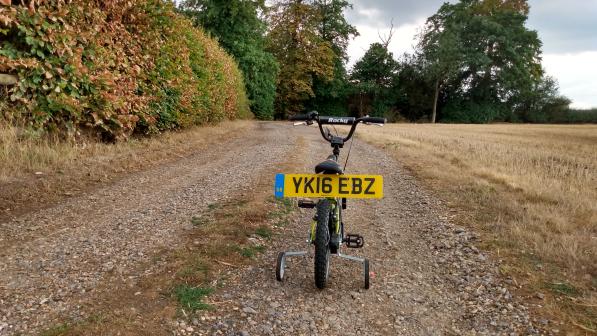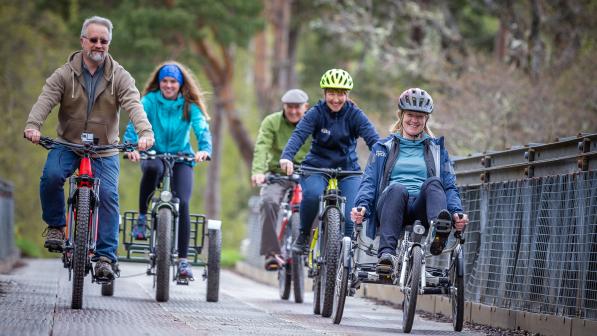Opinion: Patrick Harvie on getting Scotland cycling

I took on the job of Active Travel Minister in the Scottish Government in the late summer of 2021. As someone who has long used a bike as my default for local journeys, I was thrilled to take on this exciting role.
Since then I have hugely enjoyed the opportunity to visit, talk with and learn from many community groups and projects, all of whom are passionate about making it easier for more people to walk, wheel and cycle.
In those discussions, I listen carefully to what people feel will make the biggest difference towards increasing rates of walking, wheeling and cycling. Their reflections mirror the research undertaken by our active travel partners here in Scotland.
Infrastructure, which reallocates road space to improve safety and encourage cycling, is key. That includes accessible pavements which are inclusive by design and free of clutter, making it easier for disabled people and those with buggies or prams to walk and wheel.
Coupled with projects which widen access to bikes and help with storage, all reducing inequalities and tackling poverty, we can bring about the change that I’m pleased more and more people agree is urgently required.
The next step
We’ve taken the next big steps on the journey of transforming our towns and cities into spaces which are far safer and friendlier for people choosing active travel – but there is so much more that the Scottish Government is determined to achieve.
We’re providing record funding in 2022/23 – we have committed to investing £320 million, or 10% of the transport budget, on active travel by 2024/25. This will transform our communities in a way which will make it far easier for people to choose to walk, wheel and cycle for everyday journeys.
To achieve this vision, we need to ensure these significant funds are invested in the right way. So, we’re undertaking a review of how we build active travel infrastructure here in Scotland to deliver faster and achieve greater value for communities than ever before.
In places where the right infrastructure is already in place, we’re seeing really positive increases in cycling – but to sustain and grow this change, we need to see a continued shift in attitudes towards cycling and across all road users.
Some people do react against this agenda and raise issues in a divisive way, whether it is objecting to bike lanes, calls by UK Government ministers for cyclists to have registration plates and insurance, or people just behaving as though road space is meant solely for cars.
We need to challenge these perceptions and focus on what really matters to make the desperately needed changes in how we travel for our health and for our climate.
Hot topic
One such topic that has come up a few times in my first year is cycle helmets, with some voices calling for them to be made mandatory, or even pretending that they already are and criticising cyclists who don’t wear them. Some people feel safer wearing a helmet absolutely every time they get on a bike, and everyone should respect that choice.
Similarly, it makes sense that children learning to ride are encouraged to wear helmets, especially while they’re still building their confidence levels. Since 2010, more than 350,000 young people have learned to ride through the Scottish Government’s Bikeability scheme, and helmets and reflective clothing are provided to children undertaking that training.
We need a radical shift in attitudes and an unwavering focus on the things that matter most to get more people on bikes
Patrick Harvie, Scottish Government Minister for Active Travel
But for people with a little more experience and confidence using their bikes for everyday travel, the actual public health evidence isn’t cut and dried, so the choice is – and will remain – a personal one. There’s good reason to oppose the idea of helmet laws.
Indeed, looking to those few countries where helmet wearing is legally required, the real concern is that it has led to a reduction in cycling rates and so a reduction in all the health and wellbeing benefits which active travel brings. This would be self-defeating on safety too; if we want cycling to be safer, getting more people on bikes is one of the best things we can do to change our road culture.
I’ve been challenged for not wearing a helmet for everyday commutes – for sending the ‘wrong message’. I rarely hear the same people calling out bad street design or driver behaviour in the same way.
My view has been clear and consistent whether as a cyclist or a campaigner, or as Minister for Active Travel: Scotland needs safer streets now. This position is also shared by the main cycling organisations across the UK – none of which support mandatory helmet wearing.
Look at the countries that are already getting this right, where cycling is already far more common. In the Netherlands or Denmark you’ll see some people wearing helmets, making that choice for their own reasons and on their own terms. But overwhelmingly you’ll see people of all ages, shapes and sizes cycling with their normal clothes, from prime ministers to primary school children.
Their governments recognise that safety is focused on the design of the streets and the behaviour of other road users, not on headwear. This point is particularly relevant to encouraging people to take advantage of city bike schemes – all aimed at making cycling quick and accessible for short urban journeys.
No more barriers
A similar distraction from the important issues are the recent comments from the then UK Government Secretary of State for Transport, Grant Shapps, on registration plates and insurance for cyclists. I want to reassure people that the Scottish Government has never considered this approach.
Cycle licences or registration plates would act as another barrier making it harder for people to choose cycling for everyday short journeys. I’m clear that there are many more effective steps that can be taken to ensure that roads are safer for all users – again through quality infrastructure, improving street design and making sure that all road users are aware of good safe ways of using the roads.
Scotland requires urgent action to respond to the climate emergency. We need to tackle inequalities, eradicate transport poverty and live healthier and happier lives.
Active travel is a simple solution to some of our most complex problems – but to deliver the change we want to see, we need a radical shift in attitudes and an unwavering focus on the things that matter most to get more people on bikes. That’s my promise as Minister for Active Travel and I’m grateful for the continued support and constructive challenge offered by partners including Cycling UK.






